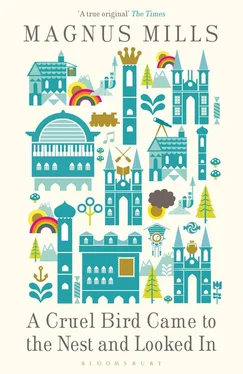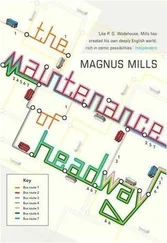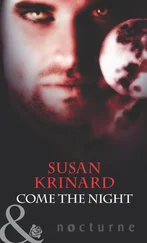I glanced around at my companions and noticed that Dotterel seemed rather ill at ease. There was evidently something bothering him but I didn’t get the chance to find out what. Next moment Smew emerged from within some inner sanctum wearing the ceremonial crown and looking unquestionably regal. He regarded the little gathering for some moments, and then spoke.
‘Why, Wryneck,’ he said, ‘aren’t you going to offer our guests some wine?’
‘Ah, yes,’ Wryneck answered, ‘I was so absorbed with the royal paintings that I clean forgot.’
For some reason the wine glasses ranged along the table were of many different sizes. They stood there glowing under the chandelier and I thought they looked most enticing. The larger glasses were towards the back; the medium and small ones nearer the front.
‘Like a drink, Sanderling?’ said Wryneck.
‘Yes, please,’ came the reply.
Wryneck turned and selected the smallest glass and handed it to Sanderling. Whether he did it on purpose I couldn’t tell, but I found I was unable to continue witnessing Sanderling’s torment. Instead I joined a short queue comprising Dotterel, Garganey, Whimbrel and Brambling. Wryneck favoured us all with large measures, but for himself he chose a glass of equal size to the one he’d given Sanderling.
Smew waited gracefully until last.
The eight of us must have looked quite magnificent as we stood assembled in our courtly attire, each holding a glass of the empire’s finest wine. Here we were, the very cream of imperial government, enjoying one another’s company in a library of international renown. All the same I couldn’t help thinking that there was some special element lacking from the occasion. To put it another way, there was no sense of allurement: no sparkle. I was unable to put my finger precisely on what we were missing, but the feeling persisted nonetheless.
I was then struck by an unrelated secondary thought. It occurred to me that we might all be expected to exchange gifts at some stage during the afternoon. A cold chill ran through me as I realised I’d made no provision for this whatsoever. Realistically, I couldn’t envisage Dotterel or Garganey producing a sackful of carefully wrapped parcels out of the blue. On the other hand, I would not have put it past Whimbrel to distribute presents left, right and centre just for the sake of it. How embarrassing, then, to be unable to offer anything in return.
I was still considering my options when Dotterel cleared his throat and addressed Smew directly.
‘Smew,’ he said, ‘there’s a matter of great urgency which I think demands the immediate attention of the cabinet.’
‘Not now, Dotterel,’ said Smew.
‘But it’s most important.’
‘Not now,’ Smew repeated. ‘It will have to wait.’
‘You mean until tomorrow?’ Dotterel enquired.
‘I mean until after the twelve-day feast.’
‘It can’t wait twelve days!’
‘Of course it can,’ said Smew. He had adopted a kind yet masterful tone of voice. ‘Nothing should be allowed to interrupt the festivities,’ he continued. ‘Affairs of state must be put to one side for the time being. So please, Dotterel, try to enjoy yourself and let’s hear no more about it.’
‘Very well,’ conceded Dotterel, bowing his head slightly and accepting a second glass of wine.
This was provided by Shrike, who had appeared as if from nowhere carrying a tray of drinks. After serving Dotterel he began circulating amongst the rest of us, and this time I was glad to see Sanderling receive the biggest glass of all. The general conversation then became much more convivial. Even Dotterel seemed to overcome his disquietude, if only temporarily.
The paintings lining the walls were not all portraits. Some of them depicted maritime scenes from the history of the empire. Sanderling now seized the opportunity to demonstrate what he had learned during his time at the admiralty. One enormous canvas showed a flotilla of sailing ships, merchantmen by the look of them, beating along some wild shore in search of a safe harbour. Taking Wryneck by the sleeve, Sanderling guided him over to the picture and started explaining it to him. Cleverly, though, he made no attempt to talk about artistic technique: brushstrokes, light, colour, perspective and so forth. This would have led him straight out of his depth. Instead he described how a ship actually sailed, commencing from first principles.
‘What you need to understand,’ he began, ‘is that the wind doesn’t simply blow the ship along. Rather, the ship takes the wind and shapes it to its own requirements.’
Wryneck stood listening intently as Sanderling outlined the basic laws of sailing. Dotterel and Garganey also moved a little closer, clearly impressed by Sanderling’s wealth of knowledge. It was a shame he had no ships with which to put it all into practice.
Whimbrel, Brambling and Smew, meanwhile, had become involved in a discussion about Smew’s pencil, which he always carried with him. He was well known for preferring pencils to pens, and now he explained the reason why.
‘The mark of a pencil is softer and less intrusive,’ he announced. ‘Moreover, it can be rubbed out. Ink on the other hand cannot be erased, and if you happen to make a splodge you’re in trouble.’
‘Won’t you require a pen for your duties as regent?’ Whimbrel suggested. ‘Surely you’ll need one for signing decrees.’
‘It is not the pen that counts,’ replied Smew. ‘It is he who wields it.’
His words had the effect of silencing any further comment from either Whimbrel or Brambling, and after that the conversation became noticeably one-sided.
Finding myself alone I decided to go for a browse along the bookshelves, taking my glass of wine with me. Occasionally I selected a title, took down the book and read the preface. Then I put it back again and moved on. This proved to be quite a pleasant pastime. The royal collection was rich in variety: tomes on every subject stood side by side in silent ranks, all waiting to be read. After a while I came upon a book I hadn’t seen since I was a child. It was called Tales from Long Ago , and as I lifted it down I felt a curious wave of anticipation pass through me. I remembered this book in particular because it had a colour picture on every other page, so that each story was encapsulated in a few scenes. Sure enough, when I opened it there was a page of text on the left side, and an illustration on the right. To my surprise I recognised the first picture as if I had only seen it the previous day, rather than many years before. It showed three men gazing up at the night sky through a tall, narrow window. I was astounded at the familiarity of the detail; also, the brightness of the colours. The three men wore blue coats, their shoes were buckled and their stockings were white. The words of the story, however, were unfamiliar. Slowly, I turned to the next page. Here was a man in a rowing boat in the middle of a lake; on his head was a yellow crown. I examined the picture and noticed that one of the oarlocks hadn’t been drawn properly. Part of it was missing, which would have made the boat impossible to row. I recalled that this had baffled me throughout my childhood. Again, though, I had no memory of the story itself, and I began to realise that when I was young I couldn’t have read the book properly. I must have spent all my time looking at the pictures. I turned the pages, one by one, and yet more half-forgotten characters were revealed. Invariably they appeared startled, bewildered, surprised or jubilant. Hidden away inside this book, they’d worn the same expressions for years and years and years. At last I arrived at the final page. I paused for a long moment. Then, as I expected, I turned over and saw a man in a broad-brimmed hat. He was peering with astonishment at a silver coin in the palm of his hand.
Читать дальше












